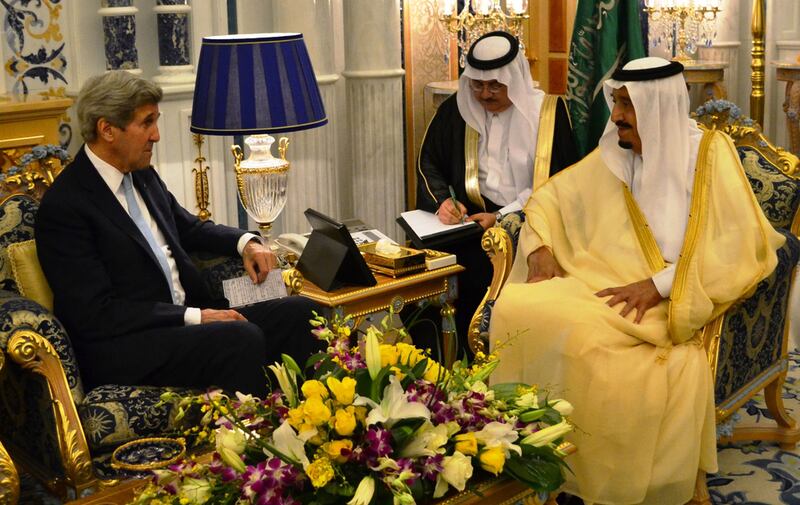Abu Dhabi // The US secretary of state John Kerry and Saudi Arabia’s King Salman discussed efforts to end the conflicts in Syria, Yemen and Libya on Sunday, ahead of multinational meetings in Europe this week.
“I want to thank you for the many things that Saudi Arabia is working on with us to great effect,” Mr Kerry told the Saudi monarch before the talks in Jeddah.
Mr Kerry and King Salman discussed US-Saudi cooperation as well as developments in the region, the official Saudi Press Agency said. He also met Saudi crown prince Mohammed bin Naif and foreign minister Adel Al Jubeir.
The US state department said Mr Kerry and the Saudi leadership discussed “a range of regional issues – Yemen, Libya, and Syria – with particular emphasis on the situation in Syria”.
Regarding Yemen, where Saudi Arabia is leading a coalition supporting the government against Houthi rebels, the state department said Mr Kerry and the Saudi leaders discussed the need to strengthen the ceasefire there, which had brought “a much needed reduction in the level of violence”, and their support for the continuation of the UN-led peace talks being held in Kuwait City.
The UN special envoy to Yemen, Ismail Ould Cheikh Ahmed, said on Sunday that he was still optimistic about the negotiations but there remained “some difficult matters ... the problem is reaching a clear political agreement”.
He declined to provide details on the progress made other than an agreement in principle to free 50 per cent of prisoners and detainees before the start of Ramadan next month.
However, in a sign of hope, Saudi officials have emphasised the Houthis' role in a future Yemeni political dispensation as well as a new focus of coalition efforts on combating the local branch of Al Qaeda and ISIL. Yemeni fighters from a range of southern groups, trained and advised by UAE special forces, have pushed the extremists from strongholds in the south, though the long-term nature of the challenge was underscored by another deadly suicide bombing in Mukalla on Sunday.
The US has deployed a small number of special forces advisers in Yemen to support the coalition’s counterterrorism operations.
Following his talks in Saudi Arabia, Mr Kerry flew to Vienna for a meeting of the 17-nation International Syria Support Group (ISSG) on Tuesday. The meeting has been convened by the US and Russia to try to restore a crumbling truce between rebels and forces supporting the Bashar Al Assad regime. Peace talks that have so far failed to produce any breakthroughs may restart later this month.
Washington and its allies, including Riyadh, support a variety of rebel groups and blame the Syrian regime and its allies, Russia and Iran, for the majority of ceasefire violations, such as the bombing last month of a hospital in rebel-held Aleppo. But US officials have also acknowledged serious rebel breaches and targeting of civilians.
A key sticking point in the so-called cessation of hostilities, which does not include ISIL or Al Qaeda’s Syria affiliate Jabhat Al Nusra, is Russia’s insistence that any rebel group cooperating even tactically with Al Nusra, or in the same geographic locations, should be excluded as well.
Officials from the ISSG hope a renewed truce would create momentum for the resumption of talks on forming a transitional government. But there have been no signs that either the rebels’ High Negotiations Council or Damascus and its allies are willing to budge on the fate of Mr Al Assad. The rebels demand that he step down at the beginning of a transitional process, while Tehran and Moscow say he will be allowed to run for re-election. The US position on his fate has become more ambiguous over time.
On Monday, Mr Kerry and Italian foreign minister Paolo Gentiloni will jointly host multinational talks on the faltering political reconciliation process in Libya.
Officials attending the talks in Vienna will “discuss international support for the new Government of National Accord, with a focus on security,” state department spokesman John Kirby said.
The UN-brokered unity government in Tripoli was established in March after months of negotiations between rival factions. Governments based in Tripoli and Tobruk both claimed outright legitimacy and engaged in a war against one another, allowing ISIL extremists to make significant gains amid the chaos.
But while the GNA has made some strides in taking control of important state institutions, the Tobruk-based administration, which is allied with the UAE and Egypt, has yet to support the new government.
Last month, in a bid to bolster the GNA, Washington added Khalifa Al Ghweil, the leader of the separate Tripoli-based administration which is backed by Islamist militias, to its sanctions list. US president Barack Obama also signed an executive order allowing any Libyans who are deemed to have obstructed the GNA or taken steps to undermine its authority through violence or by illegally selling Libyan oil, to be sanctioned.
Western governments are desperate for a swift political solution in Libya so that attention can be turned to fighting ISIL. The Libya talks will also reportedly focus on the GNA’s requests for military and intelligence assistance to fight ISIL.
tkhan@thenational.ae





